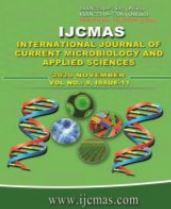


 National Academy of Agricultural Sciences (NAAS)
National Academy of Agricultural Sciences (NAAS)

|
PRINT ISSN : 2319-7692
Online ISSN : 2319-7706 Issues : 12 per year Publisher : Excellent Publishers Email : editorijcmas@gmail.com / submit@ijcmas.com Editor-in-chief: Dr.M.Prakash Index Copernicus ICV 2018: 95.39 NAAS RATING 2020: 5.38 |
Beetroot (Beta vulgaris L.) is also known as table beet, garden beet and sugar beet. Among the diseases of beetroot Cercospora leaf spot is the most devastating foliar disease which reduces the root quality and sugar content. Management of this disease mainly depends on chemical fungicides. To reduce the use of fungicides one such attempt has been made to evaluate the effect bio resources and citral essential oil compound against cercospora leaf spot in in-vivo and in-vitro in department of Plant Pathology, SHUATS, Prayagraj, and Uttar Pradesh. Citral essential oil compound was tested In-vitro at different concentrations viz., 0.75%, 0.5%, 1%, 1.25% and Carbendazim 0.01% against radial growth of Cercospora beticola. Results revealed that the minimum radial growth was observed at a concentration of citral @ 1.25% (1.40 mm) with highest per cent inhibition (96.52%) followed by citral @ 1% (4.73 mm) with per cent inhibition (88.24%) compared to control. Application of bio resources and citral essential oil compound in in-vivo revealed that disease severity was recorded minimum with the treatment Microalgae + cow dung+ poultry manure + citral (13.03%) followed by fungicide Carbendazim (13.16%). The highest yield was recorded with the treatment microalgae + poultry manure + cow dung+ citral (1.47 kg/plot). The highest total soluble solid content was recorded with the treatment Microalgae + poultry manure + cow dung+ citral (13.86 ºBrix) followed by poultry manure + citral (13.30 ºBrix). Results revealed that bio resources and citral essential oil compound may be used as eco-friendly natural compounds to reduce the cercospora leaf spot of beetroot.
 |
 |
 |
 |
 |